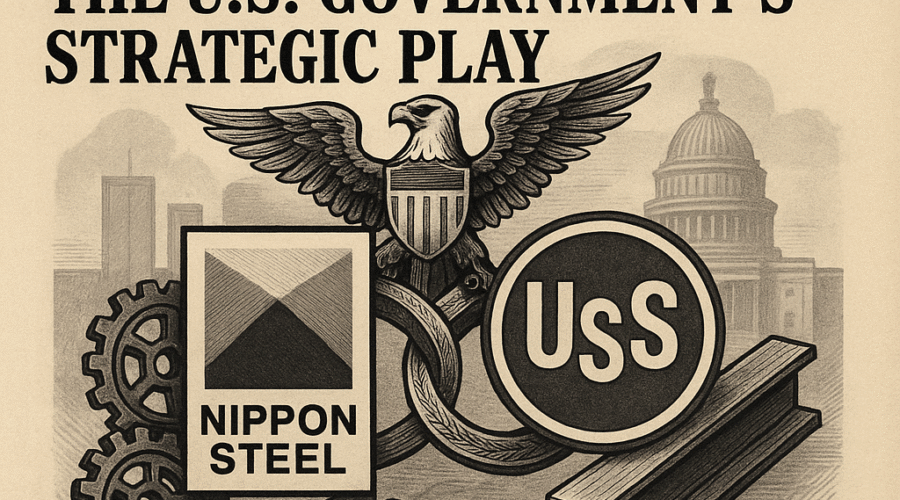The proposed $14.9 billion acquisition of U.S. Steel by Japan’s Nippon Steel Corporation has ignited a complex debate about foreign investment, national security, and corporate governance. At the center of this controversy lies the potential use of a golden share – a rare equity instrument that would grant the U.S. government veto power over critical corporate decisions. This mechanism, historically employed by governments to maintain influence in privatized entities, represents an unprecedented fusion of industrial policy and national security strategy in modern American dealmaking[1][9][16].
💼 Seasoned CorpDev / M&A / PE expertise
The Anatomy of Golden Shares
Definition and Historical Precedents
A golden share constitutes a special class of equity that confers disproportionate voting rights, typically granting its holder authority to block strategic decisions such as mergers, asset sales, or charter amendments[1][3]. First popularized during the 1980s privatization wave in the United Kingdom, golden shares enabled governments to safeguard national interests while transitioning state-owned enterprises to public markets. The British Airports Authority (BAA) and Rolls-Royce both operated under this structure for decades before European Union courts challenged the mechanism as anti-competitive[1][4].
Brazil’s experience with Embraer demonstrates the enduring relevance of golden shares in emerging markets. The Brazilian government retained veto authority over the aerospace giant’s 2019 commercial aircraft division sale to Boeing through its golden share, ultimately scuttling the $4.2 billion deal when negotiations collapsed[1]. This precedent underscores how golden shares can serve as both economic levers and instruments of geopolitical strategy.
Legal Landscape in the United States
While Delaware corporate law permits flexible share structures, golden shares remain rare in U.S. public markets due to regulatory skepticism and judicial challenges. The 2019 In re Intervention Energy ruling established that bankruptcy veto rights through golden shares might violate federal public policy if wielded by creditors rather than bona fide equity holders[11][14]. However, the Defense Production Act of 1950 provides statutory authority for extraordinary government intervention in industries deemed vital to national security, creating potential legal cover for golden shares in strategic sectors like steel production[6][13].
The Nippon Steel-U.S. Steel Transaction
Deal Structure and Political Context
Nippon Steel’s proposed acquisition would make U.S. Steel a wholly owned subsidiary while maintaining its Pittsburgh headquarters and brand identity[7][16]. The Japanese steelmaker’s commitment to honor existing labor agreements with the United Steelworkers union initially failed to assuage bipartisan concerns about foreign control of a iconic American industrial asset. President Biden’s January 2025 executive order blocking the deal marked the first use of CFIUS authority to prohibit an acquisition from a treaty ally, signaling heightened sensitivity to supply chain security[8][9].
The Golden Share Compromise
Recent reports suggest Nippon Steel may transfer a golden share to the U.S. government post-acquisition, enabling Washington to veto decisions affecting production capacity, technology transfers, or facility closures[9][16][17]. This innovative structure attempts to reconcile competing priorities:
| Stakeholder | Interest | Golden Share Impact |
|---|---|---|
| U.S. Government | Preserve domestic steel capacity for defense needs | Veto over strategic decisions |
| Nippon Steel | Access to North American markets | Operational control with oversight |
| U.S. Steel | Capital infusion for modernization | Continued government partnership |
The proposed mechanism draws parallels to Japan’s own use of golden shares in strategic enterprises like Inpex Corporation, where the Ministry of Economy, Trade and Industry retains oversight of energy resource development[9].
CFIUS and National Security Review
Expanding Jurisdiction
The Committee on Foreign Investment in the United States (CFIUS) has transformed from an obscure interagency panel into a powerful arbiter of economic statecraft. Under the 2018 Foreign Investment Risk Review Modernization Act (FIRRMA), CFIUS gained authority to scrutinize non-controlling investments in critical infrastructure and sensitive data – powers now being tested in the steel sector[10][13].
Precedent and Proportionality
CFIUS’s apparent willingness to mandate golden shares as a mitigation measure represents a novel application of its authority. Previous interventions typically involved forced divestitures or operational restrictions, as seen in the 2018 Qualcomm-Broadcom and 2020 MoneyGram-Ant Financial cases[10][13]. Legal scholars argue that conditioning approval on equity-based control mechanisms stretches the concept of “national security” beyond statutory intent, potentially inviting constitutional challenges[8][10].
Strategic Implications
National Security Considerations
The Department of Defense relies on domestic steel production for armored vehicles, naval vessels, and infrastructure projects. While U.S. Steel currently supplies less than 20% of military-grade steel, its integrated production facilities represent irreplaceable surge capacity in conflict scenarios[6][8]. The golden share proposal aims to prevent foreign rationalization of these assets while allowing capital investment – a delicate balance between economic efficiency and strategic resilience.
Economic and Trade Ramifications
Nippon Steel’s $14.9 billion offer represents a 142% premium to U.S. Steel’s pre-bid market capitalization, reflecting the Japanese firm’s urgency to diversify beyond stagnant Asian markets[7][16]. However, the golden share requirement introduces operational uncertainty that could depress valuation multiples across the industrial sector. Trade analysts warn of potential retaliation against U.S. companies seeking foreign investment, particularly in technology and energy sectors where American firms dominate global M&A activity[8][13].
Alliance Politics
The deal tests U.S.-Japan economic relations at a time of heightened cooperation against Chinese industrial overcapacity. Prime Minister Kishida’s administration has quietly lobbied for approval, framing the acquisition as strengthening allied supply chains against Beijing’s $1.4 trillion steel industry[9][17]. Failure to reach compromise risks undermining Washington’s efforts to build a united front on critical minerals and clean energy technology.
Legal and Regulatory Challenges
Corporate Governance Complexities
Introducing a golden share into U.S. Steel’s capital structure would require delisting from the NYSE and conversion to a private company, as SEC regulations prohibit disparate voting rights in public listings[5][16]. This process could trigger shareholder lawsuits under Pennsylvania corporate law, which imposes strict fiduciary duties on directors approving control transactions. Nippon Steel’s exposure to derivative litigation may exceed $500 million based on recent appraisal rights cases[11][14].
Constitutional Questions
Legal scholars raise Fifth Amendment concerns about regulatory takings if the golden share arrangement effectively transfers corporate control without compensation. The 1992 Lucas v. South Carolina Coastal Council precedent established that government actions depriving property of all economically beneficial use require just compensation – a standard potentially met if veto rights render Nippon Steel’s investment nonviable[10][14].
Conclusion: A New Paradigm for Strategic Industries
The golden share proposal represents a watershed moment in U.S. foreign investment policy, blurring traditional boundaries between free market principles and economic nationalism. While providing short-term resolution to the Nippon Steel impasse, this approach risks establishing a precedent for government equity participation in sectors from semiconductors to pharmaceuticals. As CFIUS prepares its final recommendation, policymakers must weigh the allure of retained control against the long-term costs to investment flows and alliance cohesion. The steel industry’s transformation into a geopolitical chess piece underscores the urgent need for coherent strategies balancing economic competitiveness with national security imperatives.
Sources
https://www.investopedia.com/terms/g/goldenshare.asp, https://en.wikipedia.org/wiki/Golden_share, https://jrwiener.com/mission-protection-for-traditional-companies-golden-shares/, https://www.under30ceo.com/terms/golden-shares/, https://www.mk.co.kr/en/world/11328169, https://en.wikipedia.org/wiki/Defense_Production_Act_of_1950, https://en.wikipedia.org/wiki/Proposed_acquisition_of_U.S._Steel_by_Nippon_Steel, https://www.atlanticcouncil.org/blogs/new-atlanticist/bidens-blocked-us-steel-deal-carries-big-risks-here-are-the-top-three/, https://www.nippon.com/en/news/yjj2025052700964/u-s-govt-may-hold-golden-shares-in-u-s-steel.html, https://www.stblaw.com/docs/default-source/Publications/thomasellisshogrenantitrustsource.pdf, https://www.proskauer.com/alert/the-golden-share-all-that-glitters-is-not-gold, https://au.investing.com/news/stock-market-news/us-government-could-hold-us-steel-shares-in-nippon-steel-acquisition-deal-93CH-3860736, https://www.bipc.com/assets/PDFs/Insights/CFIUS%20Handbook%20April%202025%20FINAL%20WEB%20REV.pdf, https://lawreview.uchicago.edu/print-archive/golden-share-attaching-fiduciary-duties-bankruptcy-veto-rights, https://www.hoganlovells.com/%20~/media/%20hogan-lovells/pdf/publication/4878744v1golden-share-report-final-formlwdlib01_pdf.pdf, https://www.businesstimes.com.sg/companies-markets/energy-commodities/nippon-steel-could-offer-washington-golden-share-seal-us-steel-deal-nikkei-reports, https://english.kyodonews.net/news/2025/05/56a2d4534bda-us-govt-eyes-golden-share-in-us-steel-amid-nippon-steel-buyout.html





